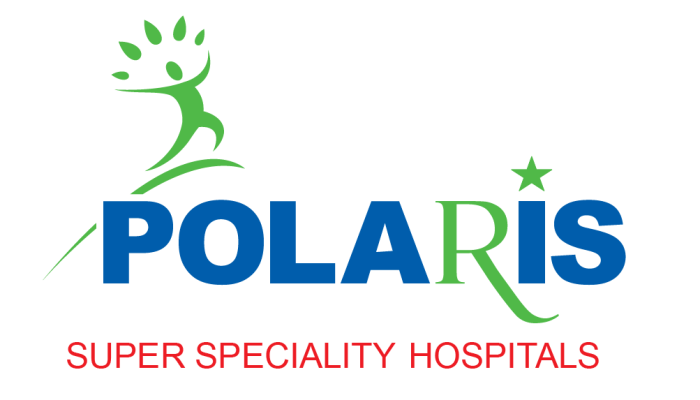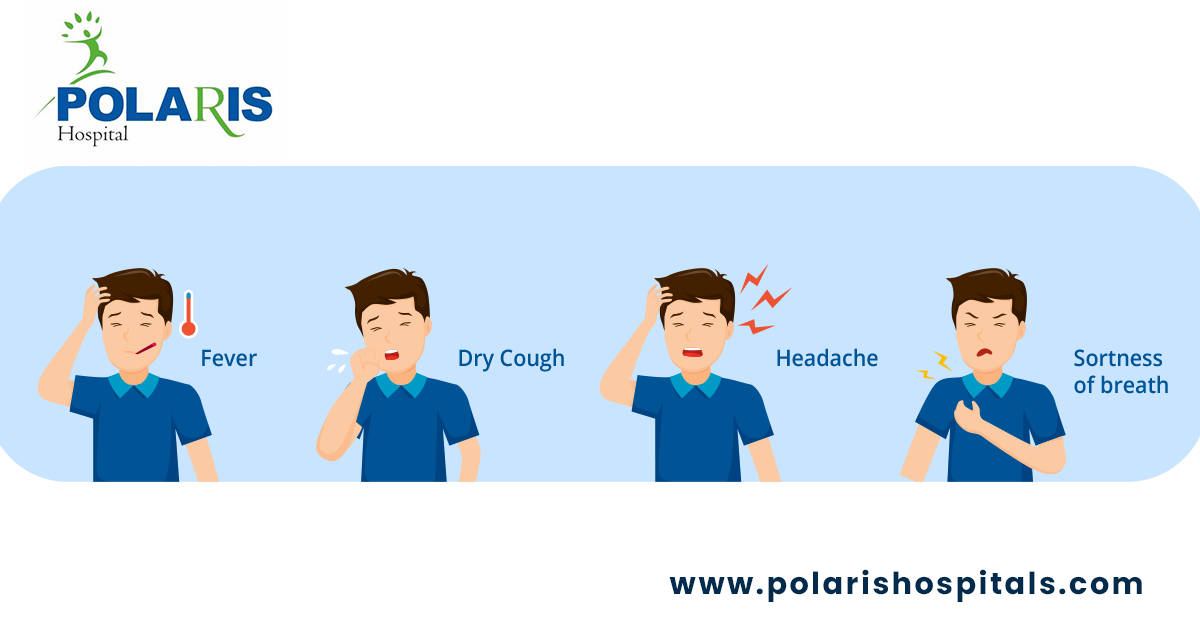COVID-19 may be a respiratory condition caused by a Symptoms of Coronavirus. Some people are infected but don’t show any symptoms. Most of the people have mild symptoms and recover on their own. But 1 in the 6 will have serious problems, like troubled breathing. the possibilities of serious symptoms are higher if you’re older or have another health condition like diabetes or heart disease.
Common Symptoms of Covid19
Researchers in India found that the leading common symptoms among people that were sick with COVID-19 include:
- Fever
- Tiredness
- A dry cough
- Loss of hunger
- Body pain
- Shortness of breath
- Mucus
Symptoms usually start 2 to 14 days after you come in contact with the virus. Further symptoms may include:
- Painful throat
- Migraine
- Chills
- Loss of smell
- Congestion
- vomiting
- Diarrhea
Emergency Symptoms
If you get one or more symptoms of Covid-19, Feel free to Call a Polaris Hospital and connect with our best doctor directly
- Problem breathing
- pressure in your chest
- Bluish lips
- Sudden confusion
You need medical care as soon as possible. Call your doctor’s or hospital before you enter. This might help them prepare to treat you and protect medical staff and other patients.
Other COVID-19 Symptoms
COVID-19 can also cause problems including:
- Coughing up blood
- Blood clots
- Seizures
- Heart problems
- Kidney damage
- Liver problems or damage
Some doctors are reporting rashes due to COVID-19, including purple or blue injury on children’s toes and feet. Researchers are looking into these reports so they can recognize the effect on people who have COVID-19.
Researchers say kids have numerous of the same COVID-19 symptoms as adults, but they have a tendency to be milder. Common symptoms in children include:
- Fever
- Cough
- Shortness of breath
Some children and teenagers who are in the hospital with the disease have an inflammatory syndrome that may be linked to the new coronavirus. Doctors call it pediatric multisystem inflammatory syndrome. Symptoms include a fever, a rash, belly pain, vomiting, diarrhea, and heart problem . It’s similar to toxic shock syndrome , a condition in children that causes inflammation in blood vessels.
How to check for fever?
Your regular body temperature may be high or less than someone else’s. It also changes throughout the day. A fever in an adult is considered to be anything over 100.4 F on an oral thermometer and over 100.8 F on a rectal thermometer.
If you think you have been exposed to the Coronavirus, or if you have symptoms of Corona, then isolate yourself and check your temperature every morning and evening for a minimum of 14 days. A fever is the most common symptom of COVID-19.
What kind of cough is common?
Early studies have found that a minimum of 60% of singles with COVID-19 have a dry cough.
What to do if you think you have mild symptoms?
- If you need medical aid, call your doctor or hospital first for guidance.
- If you’ve got milder symptoms like fever, coughing or shortness of breath, stay home unless you would like medical care.
- Tell your doctor about your illness. If you’re at high risk of complications due to your age or other health conditions, they could have more instructions.
- Isolate yourself. This means staying away from people as much as possible, even members of your family. Stay in a fixed room and use a different bathroom .
What does shortness of breath feel like?
Breathlessness or shortness of breath can feel like you:
- Have tightness in your chest
- Can’t catch your breath
- Can’t get enough air into your lungs
- Can’t breathe deeply
- Are smothering, drowning
You should monitor your oxygen levels and if they read the 80s, contact your doctor. If your face and lips get a bluish tint, rush to the crisis room of a hospital directly.
Is It COVID-19, the flu, a cold, or allergy?
Since they share so many symptoms, it can be hard to understand which condition you have. But there are a few Instructions that can help.You may have COVID-19 if you have a fever and problem in breathing, along with the symptoms listed above.If you don’t have a problem with breathing, it could be the flu. you should still isolate. It’s probably an allergy if you don’t have a fever but your eyes are itchy, you’re sneezing, and you have a runny nose.
If you don’t have a fever and your eyes are not itchy, it’s likely a cold. Call your doctor or take online consultation if you’re worried as COVID-19 can extend from mild to serious, so it may be hard to diagnose.
How to protect yourself?
- Take these steps to prevent COVID-19:
- Wash your hands often, for a minimum of 20 seconds every time, with soap and water.
- Use an alcohol-based sanitizer with a minimum of 60% alcohol if you don’t have soap and water handy.
- Limit your contact with people. stay at least 6 feet away from others if you’ve to travel out.
- Wear a cloth mask in public places.
- Avoid people who are sick.
- Do not touch your eyes, nose or mouth and wash your hands frequently.
- If you touch the unsatisfied surface a lot. Clean it often.
Caring for someone who has Symptoms of Coronavirus
- Limit your contact the maximum amount as you can. Stay in separate rooms. If you have to be in the same room, keep the window hospitable to improve air flow.
- Ask the person who’s sick to wear a face mask when you’re around each other. you should wear one, too.
- Use gloves when handling the other individual’s dishes, laundry, or trash. When you’re done,throw away the gloves and wash your hands.
- Consider taking online consultation from a doctor.
- Take care of yourself. Get enough rest and nutrition.



